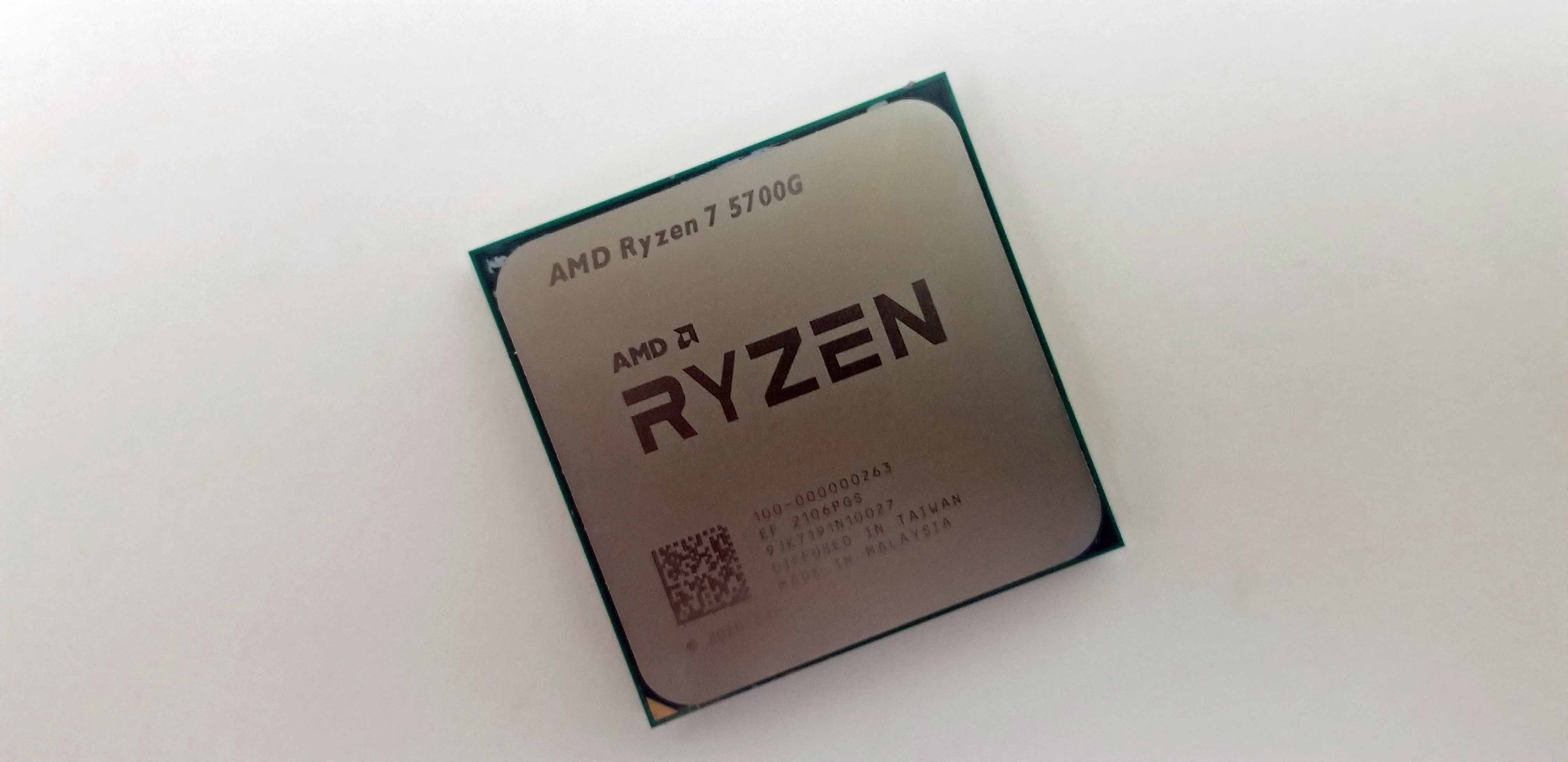Why you can trust Tom's Hardware
AMD's Ryzen 7 5700G brings the vaunted Zen 3 architecture and big CPU performance gains to its APU lineup, and the integrated Radeon RX Vega graphics engine provides smooth 1080p gaming if you're willing to accept lower fidelity settings and a limited selection of titles. The 5700G also delivers unbeatable iGPU performance for 1280x720 gaming, but it isn't the best value.
Given the fluid state of the chip market right now, it's hard to give solid buying advice — CPU and GPU pricing and availability are extremely volatile. Additionally, recent signs point to GPU supply and pricing slowly improving. That means you'll need to check current pricing on the relevant products before pulling the trigger.
The charts below outline three areas of performance: The geometric mean of our suite of integrated graphics tests at both 1920x1080 (FHD) and 1280x720 resolutions, the geometric mean of performance with a discrete GPU, and performance in single- and multi-threaded workloads.
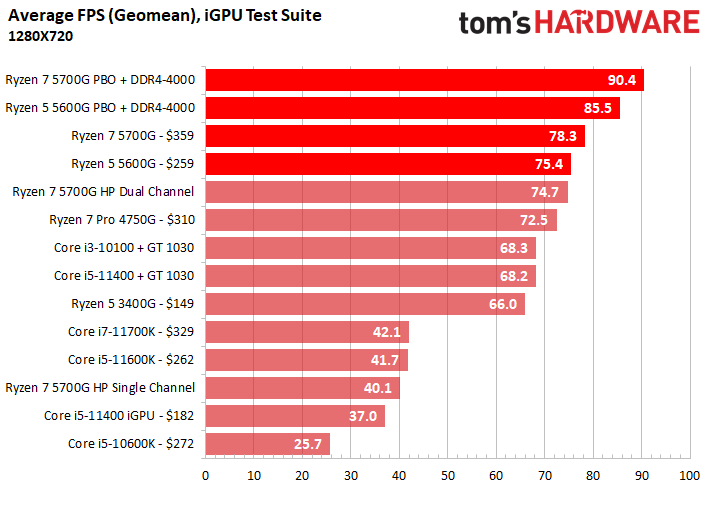
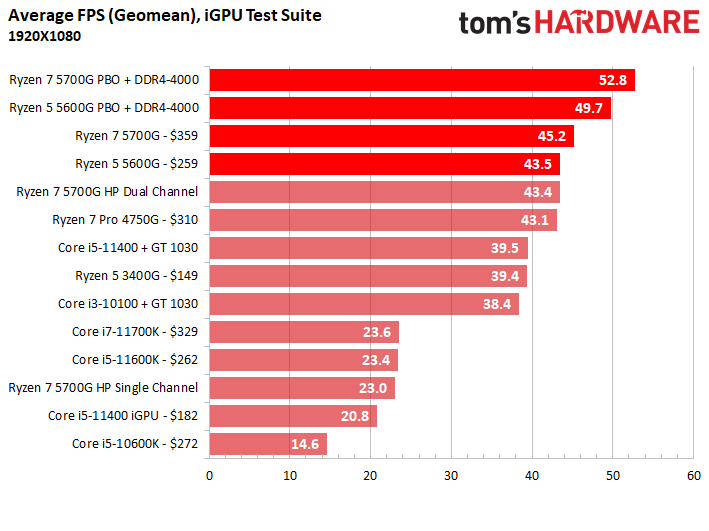
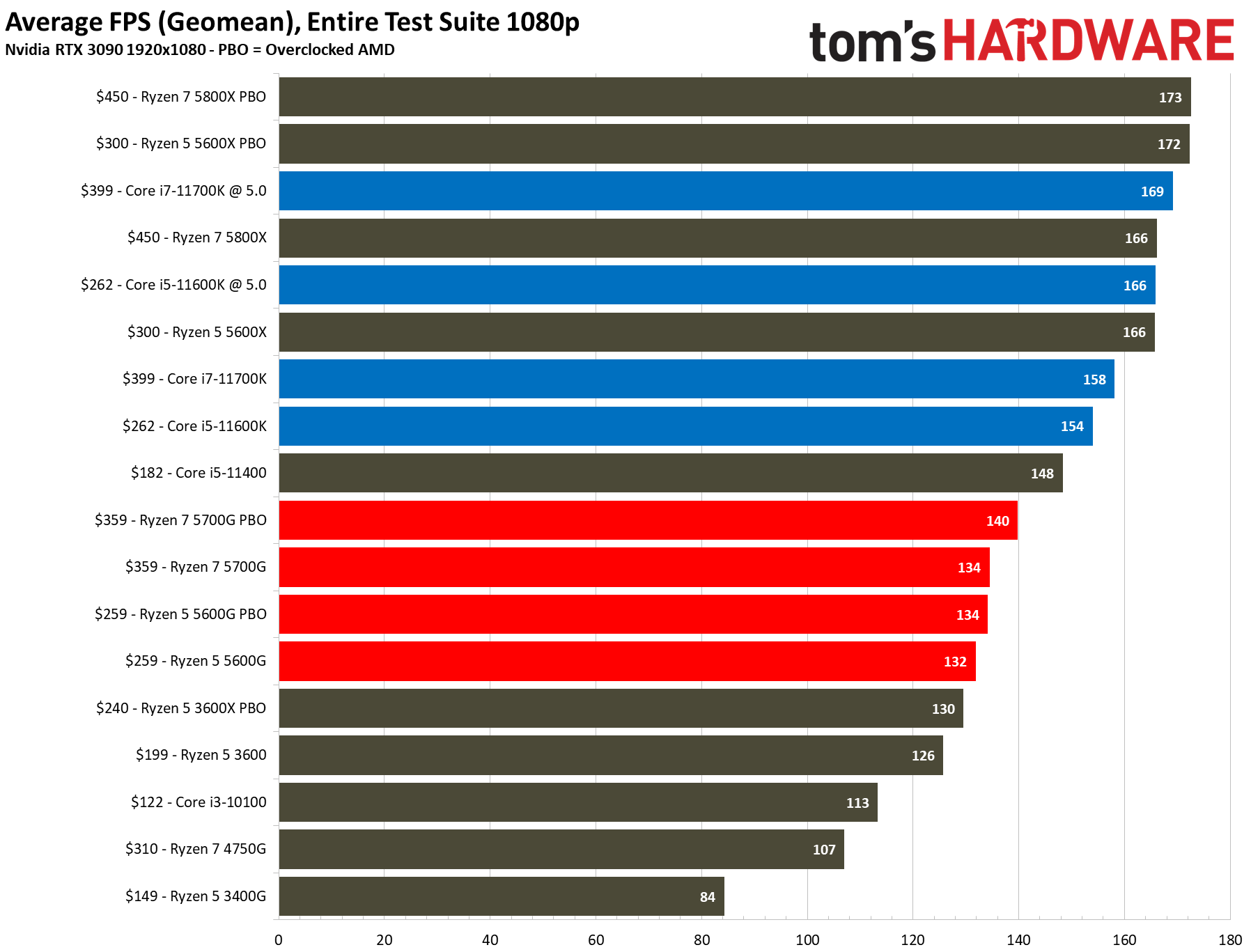
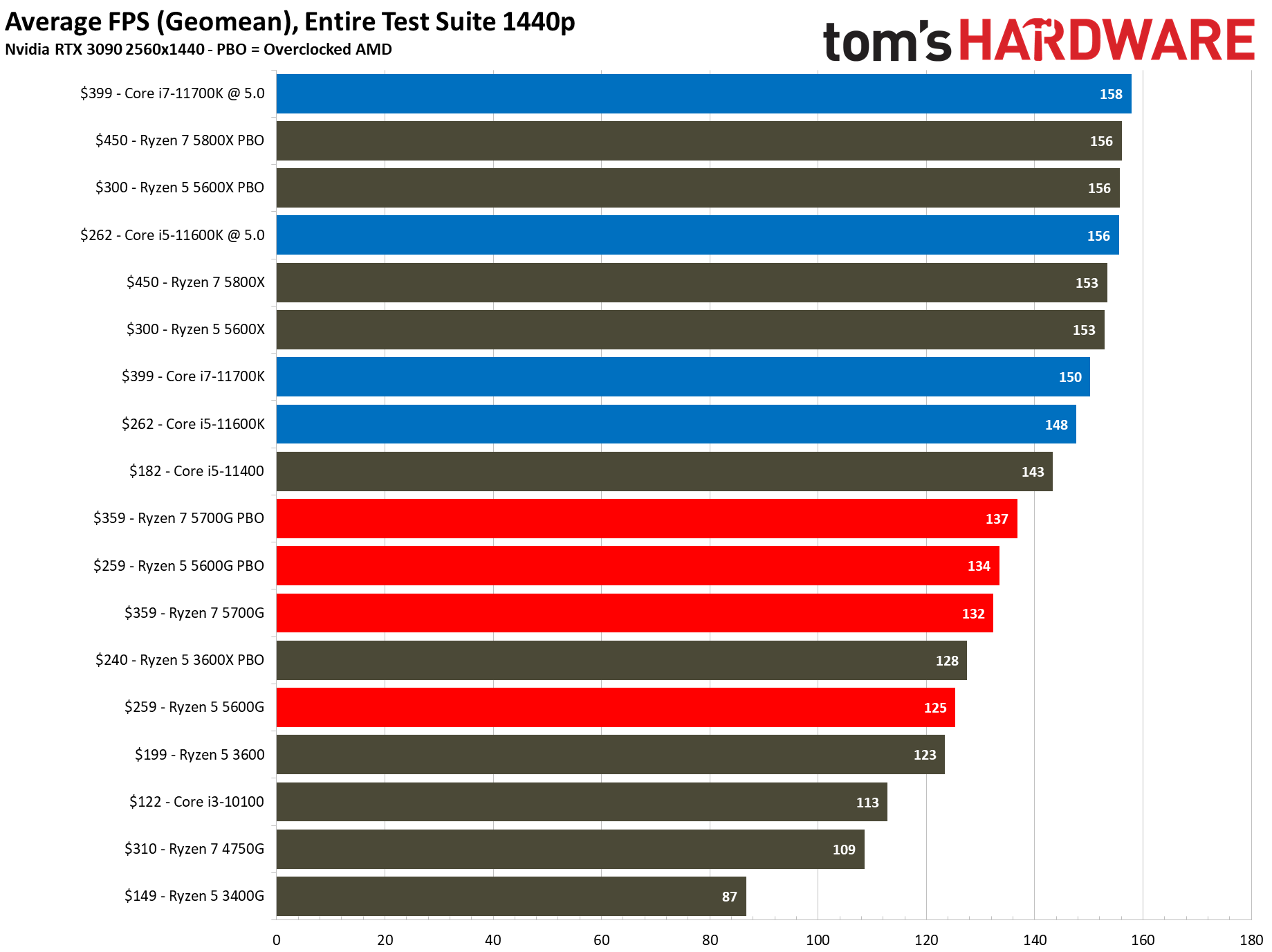
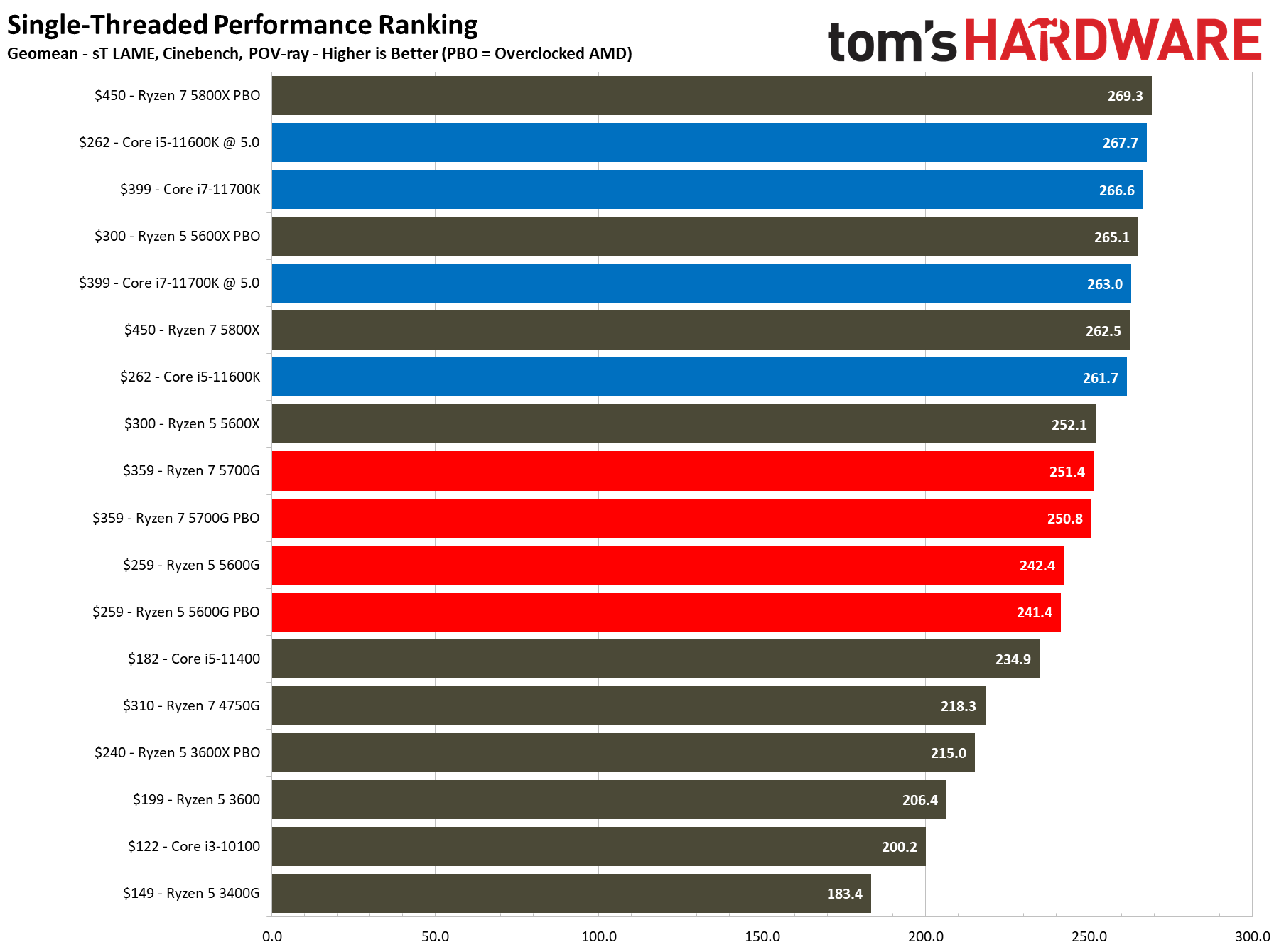
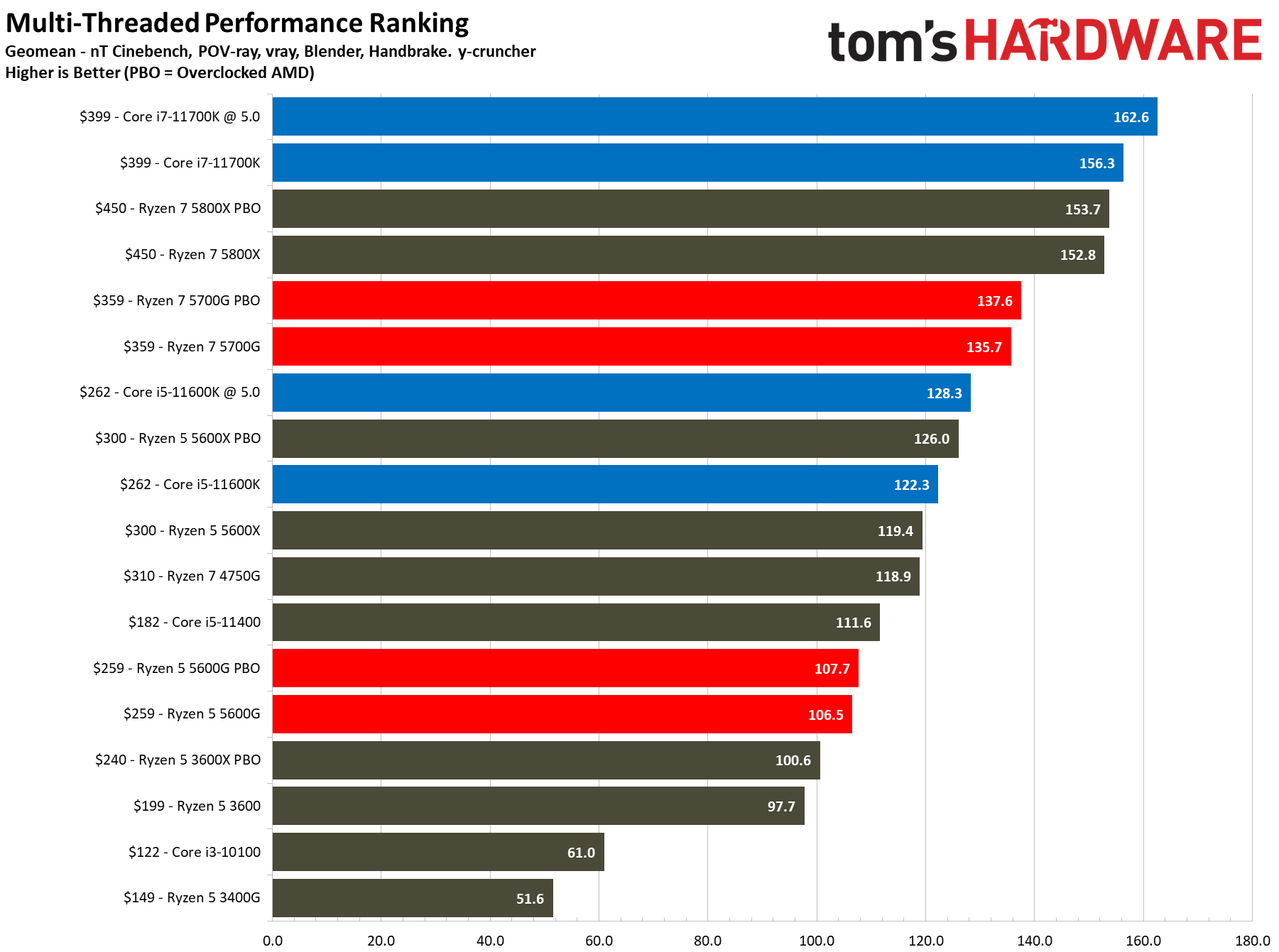
If you're looking to find the absolute fastest integrated graphics performance on the market, the Ryzen 7 5700G is the uncontested champ. As long as you adjust your expectations and fidelity/resolution settings accordingly, the Cezanne chip is plenty serviceable for its target audience. We found 1280x720 gaming to be solid across numerous titles, and while the number of titles you can play comfortably becomes restricted at 1080p, you can get away with 1080p gaming with reduced fidelity settings in many titles, too.
Ultimately the Ryzen 5 5600G is the real star of the show, though. Given that the $259 Ryzen 5 5600G's iGPU performance lands within a ~5% percent of the $359 Ryzen 7 5700G, but for 30% less cash, it's unquestionably the best value if you're looking to use the integrated graphics for gaming.
The Ryzen 7 5700G serves up solid performance with a discrete GPU, but despite AMD's positioning of the 5700G as a filler for the non-X models that it traditionally sprinkled throughout its product stack, it isn't the best value if you're looking to use it solely with a dedicated card. As such, the 5700G doesn't live up to its billing as a non-X equivalent, especially because it doesn't come close to matching its "X" counterparts, even after overclocking. You'll be far better served with a Ryzen 5 5600X or Core i5-11400 if you're looking to build a system specifically for dGPU gaming.
Given the current environment, though, the main attraction for the 5700G could be as a stop-gap solution for enthusiasts as they wait out the GPU shortage. The 5700G certainly doesn't make a convincing argument for that option, though that could fluctuate with discrete GPU pricing. The Ryzen 7 5700G is AMD's most expensive APU yet, but the aged Vega graphics engine simply isn't enough to outweigh buying an older second-hand GPU and pairing it with a chip like the Core i5-11400. You'll get more gaming performance today with that combo, and more when you upgrade the GPU after the shortage recedes.
If your focus is strictly on the productivity side of matters, the $359 Ryzen 7 5700G's performance in threaded applications slots in between the $399 Core i7-11700K and $262 Core i5-11600K. The 11700K is 15% faster in threaded applications and 6% faster in single-threaded work for about 12% more cash. You'll also have to factor the 5700G's bundled Wraith Stealth heatsink into the equation (the 11700K doesn't ship with a cooler). Conversely, the Core i5-11600K has similar performance in single-threaded work and is 10% slower in threaded work for 27% less cash. In other words, if you aren't after the 5700G's integrated graphics, there are more attractive Intel chips on either side of the pricing spectrum.
If you choose the 5700G over a 'standard' Ryzen 5000 chip, you'll sacrifice half the L3 cache, 100 MHz of peak boost clock speed, and the PCIe 4.0 interface. While PCIe 4.0 doesn't deliver any gains in gaming performance, that could change in the future with the Windows 11 Direct Storage feature that will utilize NVMe SSDs more fully. You'll also lose out on the (up to) doubled storage throughput for day-to-day file transfers and productivity applications.
Overall, if you already have a discrete GPU for your build, we think most enthusiasts will be better served with other alternatives, be they from the Ryzen 5000 product stack or Intel's lineup. Pricing is fluid, though, so be sure to check our list of Best CPUs for the latest advice.
Get Tom's Hardware's best news and in-depth reviews, straight to your inbox.
That leaves the Ryzen 7 5700G as an attractive chip for the normal APU target audience - if the price isn't a deciding factor, it will be the hands-down champ for gaming on integrated graphics, like in small form factor systems, and HTPC rigs. However, if you're dead set on purchasing an APU for iGPU gaming specifically, the Ryzen 5 5600G is a far better value.
The 5700G could slot in as a much-needed temporary solution for enthusiasts that can't find a used graphics card at reasonable pricing, but that will depend upon many factors, including the current pricing of GPUs on the second-hand market. We'll also have to temper our expectations — in the recent past, AMD has had considerable difficulty assuring a supply of its standard chips that generate higher margins. However, we have seen a steady supply of Cezanne chips since the launch, which is encouraging. Now all we need is for AMD to bring the lower-end Ryzen 3 5300G to retail for the extreme budget crowd.
MORE: Best CPUs for Gaming
MORE: CPU Benchmarks Hierarchy
MORE: All CPUs Content

Paul Alcorn is the Editor-in-Chief for Tom's Hardware US. He also writes news and reviews on CPUs, storage, and enterprise hardware.
-
lazyabum Great. Integrated GPUs are being pushed for high-end graphics over the lack of Discrete GPUsReply -
hotaru251 amd had the chance to crush intel's low end if they just had more modern apu inside...let vega die already. its 2021.Reply -
AlexWolfheart Clearly the guy that wrote this piece and declared it "the fastest integrated graphics ever" has rather limited knowledge.Reply
Amd (and Intel, working together) has an old integrated Vega that's close in performance to a gtx1060, basically obliterating the 5700G:
Intel 8809G with the Radeon M GH igpu (found inside intel hades canyon nuc)
It may not be a user replaceable apu, but it IS an igpu that can easily demolish this one in terms of performance. But then again, the clickbait title wouldn't be as good as this, now, would it? :) -
Jim90 Reply
But they ARE crushing the igpu competition...and they're showing they don't need higher than this for that.hotaru251 said:amd had the chance to crush intel's low end if they just had more modern apu inside...let vega die already. its 2021.
Once the competition catches up then, and only then, will they integrate their other choices. From a business point of view this is eminently reasonable, as much as we'd all like integrated rdna2/3 now. -
AlexWolfheart ReplyJim90 said:But they ARE crushing the igpu competition...and they're showing they don't need higher than this for that.
Once the competition catches up then, and only then, will they integrate their other choices. From a business point of view this is eminently reasonable, as much as we'd all like integrated rdna2/3 now.
So, in short, they're greedy, not offering their best because of weaker competition.
If you were hoping to defend AMD, this argument did worse ... -
King_V Reply
Where did you get the performance numbers that back this? I haven't been able to find any solid reviews on this.AlexWolfheart said:Clearly the guy that wrote this piece and declared it "the fastest integrated graphics ever" has rather limited knowledge.
Amd (and Intel, working together) has an old integrated Vega that's close in performance to a gtx1060
(not looking for YouTube videos, but article reviews with charts and such) -
fball922 Reply
Companies exist to make money, and to make as much money (legally) while expending the smallest amount of money possible, so I guess that is greedy? Doing what they are supposed to do? This is literally what every market does. If you were trying to shame AMD for not putting in an iGPU in that makes you feel warm fuzzies, this argument did worse... Of course, if they had gone the route of upgrading the iGPU, then raised the price of the APU, we would probably hear moaning and groaning about how they shouldn't raise the price because it's so greedy of them.AlexWolfheart said:So, in short, they're greedy, not offering their best because of weaker competition.
If you were hoping to defend AMD, this argument did worse ... -
AlexWolfheart ReplyKing_V said:Where did you get the performance numbers that back this? I haven't been able to find any solid reviews on this.
(not looking for YouTube videos, but article reviews with charts and such)
Have you tried... Google?
I've got the performance numbers both from google, but also from actually owning a NUC8i7HVK as my bedroom media pc, but here, i'll post links for you, since it's so hard to find info:
https://www.tomshardware.com/reviews/intel-hades-canyon-nuc-vr,5536.html
https://www.gamersnexus.net/hwreviews/3282-hades-canyon-review-intel-amd-pressure-nvidia-nuc8i7hvk
https://www.notebookcheck.net/Intel-Hades-Canyon-NUC8i7HVK-i7-8809G-Radeon-RX-Vega-M-GH-Mini-PC-Review.290800.0.html
https://www.anandtech.com/show/12572/the-intel-hades-canyon-nuc8i7hvk-review-kaby-lakeg-benchmarked
As I said before: yes, it is not a user replaceable APU, but it is an integrated gpu from over 2 years ago that still mops the floor with all other igpus. -
AlexWolfheart Reply
Given amd's very low market share in terms of gpus, but decently growing cpu market share, going all in and releasing a cpu with a very powerful igpu would be a good marketing decision, to make them sell even more, and make less people buy Nvidia.fball922 said:Companies exist to make money, and to make as much money (legally) while expending the smallest amount of money possible, so I guess that is greedy? Doing what they are supposed to do? This is literally what every market does. If you were trying to shame AMD for not putting in an iGPU in that makes you feel warm fuzzies, this argument did worse... Of course, if they had gone the route of upgrading the iGPU, then raised the price of the APU, we would probably hear moaning and groaning about how they shouldn't raise the price because it's so greedy of them.
Amd could, in theory, with rdna2 integrated, like the xbox series something and ps5, it could make customers not need to buy an rtx3060 (ti or simple), and thus, keep more marketshare for themselves ;) -
greenreaper With RDNA2 coming in 2022, and prices still abnormally high, it's hard to recommend this as an APU unless you need it now or don't care about the new architecture's boosts in power/perf - or having some level of hardware raytracing support.Reply
To me, having feature parity with the latest consoles is important, because that'll help as many games work on it as possible, even if they don't work as fast. The big question for me is whether RDNA2 will work as well without the large cache in its discrete editions.
